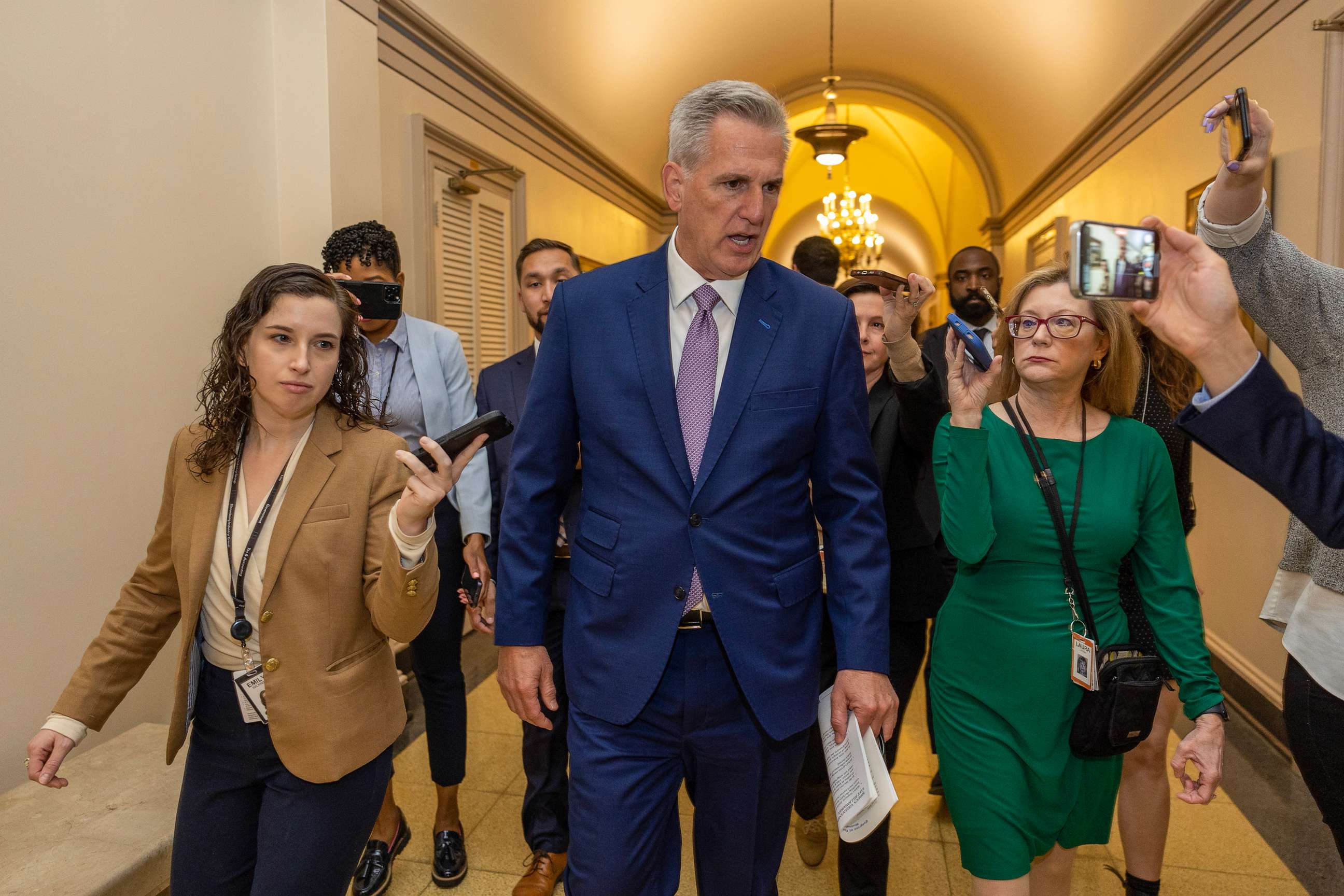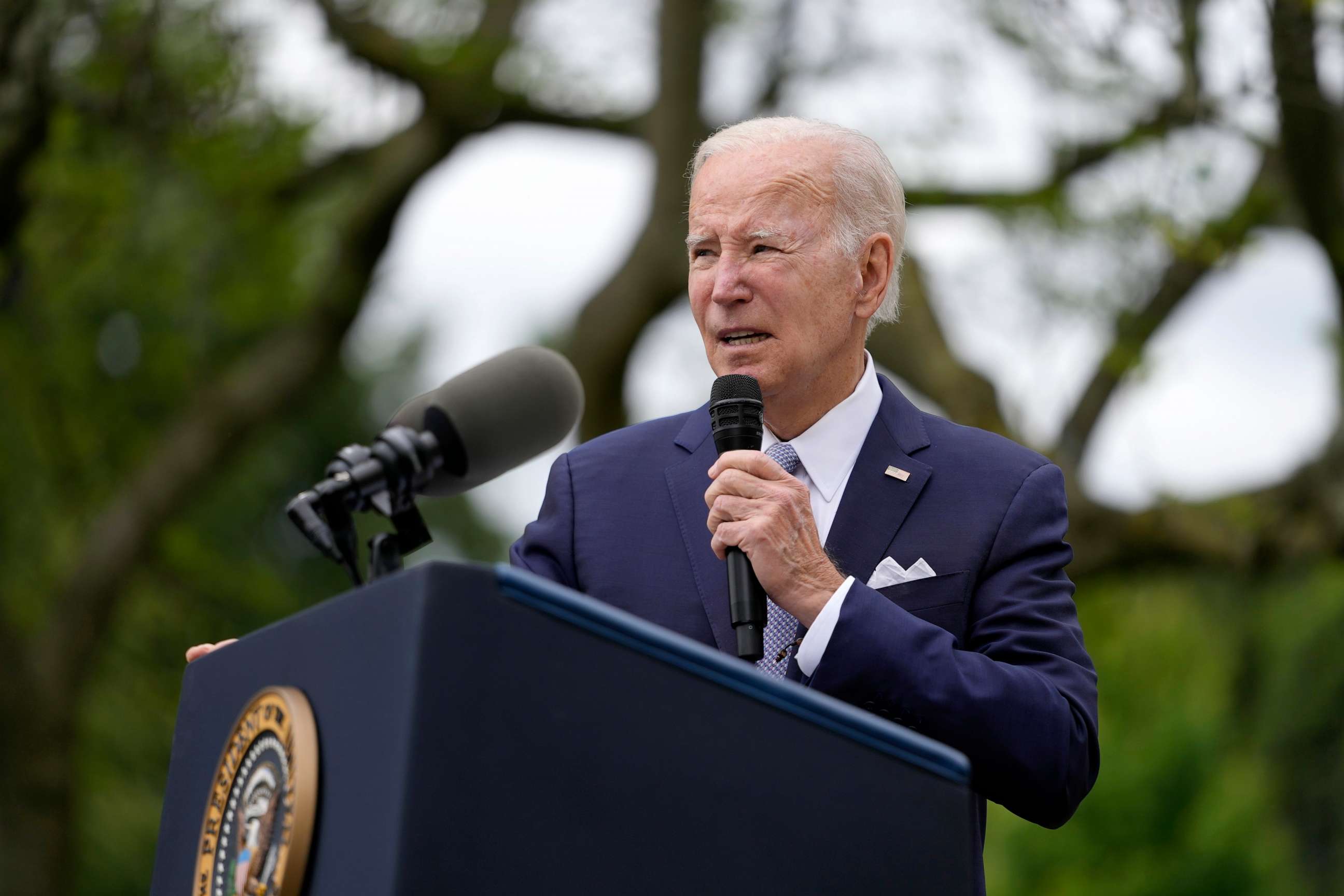US could default by June 1 unless debt ceiling is raised; Biden looks to meet with Congress
The U.S. risks being unable to pay its debts -- for the first time in history -- "as early as June 1," Treasury Secretary Janet Yellen wrote in a letter to House Speaker Kevin McCarthy and other top lawmakers on Monday in which she urged Congress to "act as soon as possible."
Yellen's update further underlined both the stalemate between legislators and the White House, and the potential financial and political risks should the stalemate not be broken in the coming weeks.
"We have learned from past debt limit impasses that waiting until the last minute to suspend or increase the debt limit can cause serious harm to business and consumer confidence, raise short-term borrowing costs for taxpayers, and negatively impact the credit rating of the United States," she wrote.
The debt limit must be raised or suspended "in a way that provides longer-term certainty that the government will continue to make its payments," she wrote.
Default would not see the U.S. unable to pay all of its bills, all at once, but it would fall behind on some amount. The treasury secretary has singled out Social Security and military payments.
Yellen, relying on the most recent data, including federal tax receipts, wrote that she could not definitively warn when the so-called "X-date" for default would begin.
"It is impossible to predict with certainty the exact date when Treasury will be unable to pay the government's bills, and I will continue to update Congress in the coming weeks," she wrote.
The nonpartisan Congressional Budget Office estimated in a report in February that default could begin in July.
But a June 1 deadline would create new urgency for the world's wealthiest nation and the lynchpin of the global economic system. What's more, Congress has little procedural wiggle room: The House alone has just 12 legislative days left in May and is in recess this week.
"The clock is ticking," Rachel Snyderman, senior associate director of economic policy at the Bipartisan Policy Center, previously told ABC News.
The House Republican majority has said they won't raise the limit further without a compromise from Democrats on spending and the federal government's budget -- which President Joe Biden has rejected, saying the ceiling should be raised without strings attached, as has happened before.
The president called all four congressional leaders -- Speaker McCarthy, House Minority Leader Hakeem Jeffries, Senate Majority Leader Chuck Schumer and Senate Minority Leader Mitch McConnell -- on Monday afternoon and invited them to a May 9 meeting on the debt limit, the White House said in a statement.

"President Biden will stress that Congress must take action to avoid default without conditions and invited the four leaders to the White House to discuss the urgency of preventing default, as well as how to initiate a separate process to address the budget and fiscal year 2024 appropriations," a White House official said.
Reactions from the four lawmakers quickly broke down along partisan lines, with McCarthy touting a bill that House Republicans narrowly passed last week to raise the debt ceiling while also enacting government spending cuts and reversing some of Biden's policies.
"The Senate and the President need to get to work -- and soon," McCarthy said in a statement. A source subsequently confirmed to ABC News that the speaker had accepted Biden's invitation for a meeting.
In Israel earlier Monday, where he is leading a congressional delegation, McCarthy said he was ready to negotiate but that "we will not pass a debt ceiling that just raises it without doing something on our debt."
"Defaulting on our debt is not an option, but neither is a future of higher taxes, higher interest rates, more dependency on China and an economy that doesn't work for working Americans," McCarthy said in a speech at the New York Stock Exchange on April 24.
In a joint statement on Monday, Schumer and Jeffries pushed back on that view: "We do not have the luxury of waiting until June 1 to come together, pass a clean bill to avoid a default and prevent catastrophic consequences for our economy and millions of American families. Republicans cannot allow right-wing extremism to hold our nation hostage."
Other leading Democrats have taken up the "hostage" label, which has been echoed by the White House.
"Republicans ... will crash the full faith and credit of the United States," Sen. Chris Coons, D-Del., said Sunday on ABC's "This Week." "That would raise the rates that your viewers are paying on credit cards or student loans or mortgages. It would throw our country into recession and hurt us globally."
Pressed by ABC's Martha Raddatz, Coons indicated that Democrats are interested in negotiations on spending separate from the debt limit.
"What's the mix of revenue increases and spending cuts that makes sense going forward?" he said.
At a briefing on Monday, White House press secretary Karine Jean-Pierre said that, despite GOP arguments otherwise, the administration views the debt and the budget separately, and that Congress had a "constitutional duty" to address the ceiling.
"The president said he's happy to meet McCarthy, but not whether or not the debt limit gets extended. That's not negotiable," she said.
The U.S. can pay most but not all of its bills with the tax and other revenue it takes in, and it must borrow the rest of the money. But Congress enforces a limit on how much debt the government can incur and when that ceiling -- set at about $31.4 trillion -- is reached, lawmakers must increase it before the government can borrow more funds.
The U.S. hit the current debt limit in January and has been employing "extraordinary measures" since then to keep its bills paid, according to Yellen. The Treasury Department has also enacted some cutbacks, including contributions to employees' retirement plans.
The country is not widely thought to have ever truly defaulted on its debts before, though a Congressional Research Service report from 2016 noted that such a concept doesn't have a fixed definition. That report also detailed "three episodes in the federal government's fiscal history" -- amid the War of 1812, the Great Depression and in 1979 -- "when some have questioned the public credit of the U.S. government."

The government's banking chief and outside experts agree on the potential damage.
Mark Zandi, the top economist at Moody's Analytics, testified in March before the Senate on the risk posed by a debt default, calling it "an immediate threat to any optimism the economy can skirt recession in the coming year and ... a long-term threat to the nation's finances and economic growth. Financial markets and the economy would be hit hard."
Zandi later told ABC News that, if the government's bills go unpaid, markets would "react very violently."
"We'd see declining stock prices and wild gyrations in markets," he said.
"Congress raising the debt ceiling is really the only alternative," Federal Reserve Chairman Jerome Powell said in March, in his own testimony on Capitol Hill. "There are no rabbits in hats to be pulled out on this."
McCarthy and other Republicans say the obligation now lies with Biden, who hasn't met with the speaker since February.
"We've been very vocal. It's been over two months since President Biden has sat down with Speaker McCarthy to have negotiations. President Biden is clearly trying to run out the clock and create a debt crisis. That's irresponsible," House Majority Leader Steve Scalise said on "This Week."
McConnell said as much, too, last week. "We must never default and the agreement needs to be reached between the speaker and the president," he told reporters on Wednesday, citing deal-making on the debt ceiling that he and then-Vice President Biden worked on in 2011.
The limit has been raised or temporarily suspended regularly over the years, sometimes with protracted negotiations and concessions against a similar tide of rising alarm -- and sometimes without.
Snyderman, with the Bipartisan Policy Center, called the issue a matter "of political will. Both sides of the aisle know how to address this."
ABC News' Mary Bruce, Cheyenne Haslett, Alexandra Hutlzer, Jay O'Brien, Allison Pecorin, Lauren Peller, Rachel Scott, Trish Turner and Max Zahn contributed to this report.




